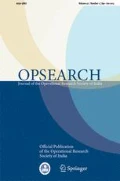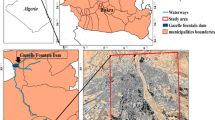Abstract
Shipping logistics is one of the very important criteria which can directly and indirectly affect the economy and GDP of any country. Shipping logistics depends on various factors which have been addressed by several authors in their previous studies. Studies in this literature are focused on selecting the most impactful factors among all the criteria. Methods used in this literature are fuzzy Analytical hierarchy process (AHP) and fuzzy Technique for order of Preference by Similarity to Ideal Solution (TOPSIS) for multi-criteria decision analysis. These methods also helped in this literature to develop a new hybrid method “fuzzy TOPSIS AHP”. There have been no studies involving maritime logistics with comparative analysis of multi-criteria decision making i.e., fuzzy AHP and fuzzy TOPSIS AHP. The literature involved large number of expert opinions on the factor prioritization of maritime logistics. Factors selected for prioritization are Environmental Sustainability, Supply and Demand, Operations and Port Selection. However, the research showed that the comparative analysis of the results was quite opposite to one another and proposed a new way for researchers to use the hybrid method of fuzzy TOPSIS AHP method in future research. The study aimed to improve the existing maritime model which can help professionals to get connected with the maritime logistics firms. The study also aims to contribute this model for researchers in their study related to maritime logistics.

Similar content being viewed by others
Availability of data and material
Code available in MS Excel.
Notes
Source: Ministry of Shipping-GOI, Care Ratings, Indian Ports Association, https://www.ibef.org/download/ports-mar-2019.pdf.
References
Acciaro, M., Vanelslander, T., Sys, C., Ferrari, C., Roumboutsos, A., Giuliano, G., Lam, J.S.L., Kapros, S.: Environmental sustainability in seaports: a framework for successful innovation. Marit. Policy Manag. 41(5), 480–500 (2014). https://doi.org/10.1080/03088839.2014.932926
Chen, C.T.: Extensions of the TOPSIS for group decision-making under fuzzy environment—(Vertex method—full formulars—do exel file). Fuzzy Sets Syst. 114(1), 1–9 (2000). https://doi.org/10.1016/S0165-0114(97)00377-1
Corbett, J.J., Winebrake, J.: The Impacts of Globalisation on International Maritime Transport Activity. Springer, Berlin (2008)
D’este, G.M., Meyrick, S.: Carrier selection in a RO/RO ferry trade part. Decision factors and attitudes. Marit. Policy Manag. 19(2), 115–126 (1992). https://doi.org/10.1080/03088839200000019
Daganzo, C.F.: The crane scheduling problem. Transp. Res. Part B 23(3), 159–175 (1989). https://doi.org/10.1016/0191-2615(89)90001-5
Daultani, Y., Goswami, M., Vaidya, O.S., Kumar, S.: Inclusive risk modeling for manufacturing firms: a Bayesian network approach. J. Intell. Manuf. 30(8), 2789–2803 (2019)
De, A., Mogale, D.G., Zhang, M., Pratap, S., Kumar, S.K., Huang, G.Q.: Multi-period multi-echelon inventory transportation problem considering stakeholders behavioural tendencies. Int. J. Prod. Econ. 225, 107566 (2019)
Ducruet, C., Lugo, I.: Cities and transport networks in shipping and logistics research. Asian J. Shipp. Logist. 29(2), 145–166 (2013). https://doi.org/10.1016/j.ajsl.2013.08.002
Gupta, E.V., Mogale, D.G., Tiwari, M.K.: Optimal control of production and maintenance operations in smart custom manufacturing systems with multiple machines. IFAC-PapersOnLine 52(13), 241–246 (2019)
Kumar, S., Hoffmann, J.: Globalization: the Maritime nexus. In: Grammenos, C. (ed.) Handbook of Maritime Economics and Business, pp. 35–62. Loyds List Press, London, United Kingdom (2002)
Hsieh, T.Y., Lu, S.T., Tzeng, G.H.: Fuzzy MCDM approach for planning and design tenders selection in public office buildings. Int. J. Project Manag. 22(7), 573–584 (2004). https://doi.org/10.1016/j.ijproman.2004.01.002
Jugović, A., Komadina, N., Hadžić, A.P.: Factors influencing the formation of freight rates on maritime shipping markets. Sci. J. Marit. Res. 29, 23–29 (2015)
Kim, K.H., Moon, K.C.: Berth scheduling by simulated annealing. Transp. Res. Part B Methodol. 37(6), 541–560 (2003). https://doi.org/10.1016/S0191-2615(02)00027-9
Le, T.V., Stathopoulos, A., Van Woensel, T., Ukkusuri, S.V.: Supply, demand, operations, and management of crowd-shipping services: a review and empirical evidence. Transp. Res. Part C Emerg. Technol. 103(March), 83–103 (2019). https://doi.org/10.1016/j.trc.2019.03.023
McGinnis, L.M.: Maternal separation vs removal prom group companions in rhesus monkeys. J. Child Psychol. Psychiatry 20(1), 15–27 (1979). https://doi.org/10.1111/j.1469-7610.1979.tb01703.x
Meena, S.R., Meena, S.D., Pratap, S., Patidar, R., Daultani, Y.: Strategic analysis of the Indian agri-food supply chain. Opsearch 56(3), 965–982 (2019). https://doi.org/10.1007/s12597-019-00380-5
Mogale, D.G., Lahoti, G., Jha, S.B., Shukla, M., Kamath, N., Tiwari, M.K.: Dual market facility network design under bounded rationality. Algorithms 11(4), 54 (2018)
Mogale, D.G., Ghadge, A., Kumar, S.K., Tiwari, M.K.: Modelling supply chain network for procurement of food grains in India. Int. J. Prod. Res. (2019a). https://doi.org/10.1080/00207543.2019.1682707
Mogale, D.G., Cheikhrouhou, N., Tiwari, M.K.: Modelling of sustainable food grain supply chain distribution system: a bi-objective approach. Int. J. Prod. Res. (2019b). https://doi.org/10.1080/00207543.2019.1669840
Pham, H.C., Nguyen, T.T., Mcdonald, S., Tran-Kieu, N.Q.: Information sharing in logistics firms: an exploratory study of the Vietnamese logistics sector. Asian J. Shipp. Logist. 35(2), 87–95 (2019). https://doi.org/10.1016/j.ajsl.2019.06.001
Pratap, S., Daultani, Y., Tiwari, M.K., Mahanty, B.: Rule based optimization for a bulk handling port operations. J. Intell. Manuf. 29(2), 287–311 (2018)
Psaraftis, H.N.: Green maritime logistics: the quest for win-win solutions. Transp. Res. Procedia 14, 133–142 (2016). https://doi.org/10.1016/j.trpro.2016.05.049
Rødseth, K.L., Wangsness, P.B., Schøyen, H.: How do economies of density in container handling operations affect ships’ time and emissions in port? Evidence from Norwegian container terminals. Transp. Res. Part D Transp. Environ. 59, 385–399 (2018). https://doi.org/10.1016/j.trd.2017.12.015
Saaty, T.L.: How to make a decision: advice for scientists. Eur. J. Oper. Res. 48, 9–26 (1990)
Sayareh, J., Alizmini, H.R.: A hybrid decision-making model for selecting container seaport in the persian gulf. Asian J. Shipp. Logist. 30(1), 75–95 (2014). https://doi.org/10.1016/j.ajsl.2014.04.004
Seo, Y.J., Ha, M.H., Yang, Z., Bhattacharya, S.: The ship management firm selection: the case of South Korea. Asian J. Shipp. Logist. 34(3), 258–268 (2018). https://doi.org/10.1016/j.ajsl.2018.09.008
Singh, S.H., Maiyar, L.M., Bhowmick, B.: Assessing the appropriate grassroots technological innovation for sustainable development. Technol. Anal. Strateg. Manag. 32(2), 175–194 (2020)
Sirisawat, P., Kiatcharoenpol, T.: Fuzzy AHP-TOPSIS approaches to prioritizing solutions for reverse logistics barriers. Comput. Ind. Eng. 117, 303–318 (2018). https://doi.org/10.1016/j.cie.2018.01.015
Tong, J., Nachtmann, H.: Cargo prioritization and terminal allocation problem for inland waterway disruptions oa. Marit. Econ. Logist. 19(3), 403–427 (2017). https://doi.org/10.1057/mel.2015.34
Trishala, S.: Insights into the Indian Maritime Industry and ports in India, pp. 1–26 (2016). http://www.aivp.org/wp-content/uploads/2016/06/suresh_trishala_indian_maritime_industry.pdf
Ugboma, C., Ugboma, O., Ogwude, I.C.: An analytic hierarchy process (AHP) approach to port selection decisions—empirical evidence from Nigerian ports. Marit. Econ. Logist. 8(3), 251–266 (2006). https://doi.org/10.1057/palgrave.mel.9100160
Ursavas, E.: Crane allocation with stability considerations OA. Marit. Econ. Logist. 19(2), 379–401 (2017). https://doi.org/10.1057/mel.2015.35
Venkita Subramanian, K., Thill, J.C.: Effect of privatization and inland infrastructural development on India’s container port selection dynamics. Asian J. Shipp. Logist. 35(4), 220–229 (2019). https://doi.org/10.1016/j.ajsl.2019.12.009
Zeng, Q., Feng, Y., Chen, Z.: Optimizing berth allocation and storage space in direct transshipment operations at container terminals oa. Marit. Econ. Logist. 19(3), 474–503 (2017). https://doi.org/10.1057/mel.2016.2
Acknowledgements
Authors thank anonymous reviewers for their constructive comments.
Funding
No funding applicable for this research.
Author information
Authors and Affiliations
Contributions
All authors were involved in the entire research work. All authors read and approved the final manuscript.
Corresponding author
Ethics declarations
Conflict of interest
The authors declare that they have no competing interests.
Ethics approval and consent to participate
Not applicable.
Additional information
Publisher's Note
Springer Nature remains neutral with regard to jurisdictional claims in published maps and institutional affiliations.
Rights and permissions
About this article
Cite this article
Prajapati, D., Daultani, Y., Cheikhrouhou, N. et al. Identification and ranking of key factors impacting efficiency of Indian shipping logistics sector. OPSEARCH 57, 765–786 (2020). https://doi.org/10.1007/s12597-020-00442-z
Accepted:
Published:
Issue Date:
DOI: https://doi.org/10.1007/s12597-020-00442-z




